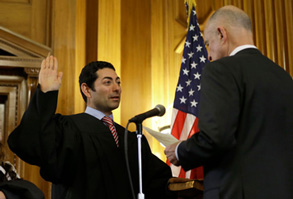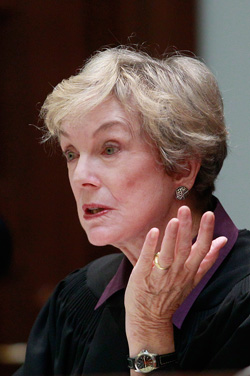Shifting
alliances tally up to more unpredictable CA Supreme Court
By John Roemer
Special to the Bar Journal
After
decades of domination by conservatives, the newly reconstituted state Supreme
Court is now approaching political parity.
 |
Cuéllar takes the oath of office from Gov. Jerry Brown (AP Photo)
|
It’s not
just the three fresh Democratic justices appointed by Gov. Jerry Brown who have
altered the high court’s makeup. Goodwin H. Liu, appointed in 2011, was joined
last year by Mariano-Florentino Cuéllar and Leondra
R. Kruger.
That
made for a 4-3 divide that still favors the Republican appointees: Tani G.
Cantil-Sakauye, the chief justice, Kathryn Mickle Werdegar, Ming W. Chin and
Carol A. Corrigan. But it is Werdegar’s political odyssey
leftward – not the new appointees – that is shifting the bench calculus.
In
themselves, Brown’s appointments have uncanny echoes of the 1970s and ’80s, during
his first term as governor. Brown placed seven justices on the court, three of
whom were ousted from the bench in a politically charged 1986 retention
election focused on Chief Justice Rose E. Bird’s rejection of the death
penalty.
 |
Werdegar (AP Photo)
|
Now Brown
has a second chance to remake the court in a state where aversion for capital
punishment has steadily progressed. A 2014 poll found that 56 percent of voters
said they still support the death penalty, but it was a sharp drop from 68
percent in 2011. The issue could come before voters this year. Two competing
voter initiatives are vying to get on the ballot.
The
surprise is that the most outspoken justice on the topic has been Werdegar, who
wrote for a unanimous court last year that the Eighth Amendment’s ban on cruel
and unusual punishment could potentially be extended to include the lengthy,
arbitrary delays in executions that have plagued California’s death penalty
system.
Although
the court affirmed the conviction and death sentence of a man convicted of
robbing and shotgunning to death a groom on the eve of his wedding, Werdegar’s
lengthy opinion gave a thorough, respectful airing of the delay claim.
“But
although we have consistently and recently, rejected the Eighth Amendment/delay
claim,” she wrote, “doctrine can evolve.” The concept of cruel and unusual
punishment, she added, ratified in the Eighth Amendment in 1791, “is not a
concept carved in 18th-the century stone.”
Rather
it “must draw its meaning from the evolving standards of decency that that mark
the progress of a maturing society,” she said, quoting from a recent U.S.
Supreme Court opinion. Werdegar’s opinion invited defense lawyers to expand the
delay argument in future habeas corpus petitions. People v. Seumanu,
S093803 (Aug. 24, 2015).
A
Wilson appointee
It was one
sign of Werdegar’s steady leftward evolution. Appointed in 1994 by Republican Gov.
Pete Wilson, whom she dated briefly when both attended the UC Berkeley law
school then known as Boalt Hall, Werdegar worked for the previous six years at
the high court as a senior staff attorney for the conservative Justice Edward
A. Panelli.
Many
assumed she would vote with Wilson’s conservative appointees, like Janice
Rogers Brown and Ming W. Chin, and often she did. But Werdegar slowly came to
be seen as one who would favor limits on police power, liability for gun makers
and the expansion of laws letting consumers sue over unfair business practices.
The
Supreme Court is overwhelmingly unanimous in its rulings, and the politics of
its justices are only sometimes on display, of course. But when divisions arose,
Werdegar was – during the years before Brown once again took office in 2011 – the
most likely to agree with the lone Democrat then on the bench, Carlos R.
Moreno.
Now
retired, Moreno said of Werdegar in a 2013 interview, “She’s very composed and
proper but it does belie her judicial philosophy and judicial opinions. She
sees a matter a certain way and doesn’t care which way the wind blows.”
Werdegar,
a former professor of criminal law, once told The Daily Journal, “I don’t think
I’m afraid to say the police are wrong.”
Criss-crossing
the political aisle
So when
the left-leaning Liu got his robes, Werdegar was prepared to be an ideological
ally. The two often discussed cases and found they shared views. “We do tend to
see things the same way on those rare cases when there is a division,” Werdegar
said. “It makes it easier to write concurring opinions if you can talk it out.”
Werdegar’s
liberal leanings aren’t confined to criminal cases.
Indeed, Werdegar
was well to the left of Liu in the court’s 2014 high-impact Iskanian labor
law decision. Liu found a loophole in the U.S Supreme Court’s Concepcion ruling after the U.S high court prioritized the Federal Arbitration Act over
California contract law and affirmed class action waivers. Liu agreed with that
pro-business outcome, but held that a form of employee representative action
remains valid under state law and is immune from class-action waivers. Iskanian
v. CLS Transportation Los Angeles LLC, 59 Cal.4th 348 (June 23, 2014).
Werdegar,
in effect, dismissed Concepcion. Dissenting at length, she had no
problem with Liu’s loophole, but contended that the whole notion of forbidding
workers to act collectively is bogus. Congress in the 1930s banned employers
from forcing workers to sign so-called “yellow dog contracts” that required
them to promise not to join unions.
“Eight
decades ago, Congress made clear that employees have a right to engage in
collective action and that contractual clauses purporting to strip them of
those rights as a condition of employment are illegal,” Werdegar wrote. “What
was true then is true today,” including the right to pursue collective action
in court, she added, concluding, “Today’s class-action waivers are the
descendants of last century’s yellow dog contracts.”
Congress’
affirmation of workers’ rights in the 1930s came well after the 1925 Federal
Arbitration Act and expressly superseded it and any other act to the contrary,
Werdegar argued. In fact, the Wagner Act and other pro-labor laws were designed
to minimize the need for strikes by authorizing courtroom resolution of
grievances. If class-action waivers are valid, employees “would be protected if
they elected to protest through strikes or walkouts but precluded from
resolving grievances through peaceable collective action,” Werdegar noted.
Six
months after penning that progressive broadside, Cuéllar
and Kruger came along, and Werdegar emerged as the court’s potential swing
vote.
A history of shifting alliances
Not
that Brown’s appointees are voting in lockstep. As the new court formed and
solidified, shifting alliances were its early hallmark. Liu, Cuéllar
and Werdegar voted unsuccessfully in April 2015 to grant a review petition for
a case where a sex crimes prosecutor threatened to bring charges against a
defense investigator and implied that the defense lawyer could also be
prosecuted. Kruger voted with the majority to deny the petition. In May, Liu, Cuéllar and Werdegar again lined up to rehear a death appeal
but were outvoted, with Kruger again on the other side.
But in August, in a vote that appeared to solidify an emerging
liberal bloc, Liu, Cuéllar, Kruger and Werdegar sided together in a 4-3 decision
that prosecutors did not prove enough in a gang case to warrant a sentence
enhancement under a street terrorism statute. People v. Prunty, 214
Cal.App. 4th 1110 (Aug. 27, 2015).
The case was significant because the liberal majority opposed for
the first time the high court’s leader, Cantil-Sakauye, in a criminal matter.
The chief justice is married to a former Sacramento police officer, and her
conservative colleagues are tough on crime.
The
fissures showed in Cantil-Sakauye’s dissent, which called the case “a classic
gang crime” and faulted the majority for failing to see it that way. Chin
joined her; Corrigan dissented and concurred separately.
A former
high court justice, Joseph R. Grodin, who was ejected from the bench alongside
fellow Brown appointee Bird in 1986, said he thought the majority got it right
by finding the prosecution offered little more than guilt by association to
demonstrate a street gang affiliation.
“While
the context and issue are quite different,” Grodin said in a published
interview, “I am reminded of the controversy, during the 1950s, over ascribing
criminal liability based on membership in the Communist Party.”
Added
Grodin, now an emeritus professor at UC Hastings College of the Law: “In
broader terms, it would be premature to say that the case is evidence of a new
majority on the court in criminal cases, but if that should develop we ought
not to be surprised.”
John Roemer is a San Francisco Bay Area freelance writer who has
covered the California legal community for more than 20 years.